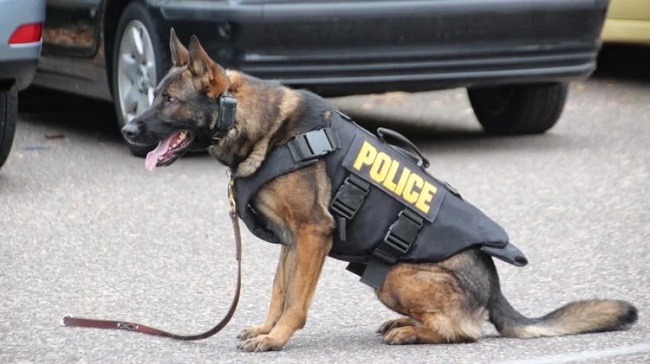Adopting retired police dogs can be a unique and gratifying experience. These dogs, having served in law enforcement, often need loving homes to enjoy their retirement years.
Despite their rigorous training and intense work life, retired police dogs can transition smoothly into family life with the right care and understanding.
This in-depth guide aims to provide potential adopters with insights into the adoption process, the challenges and rewards of caring for these exceptional dogs, and tips for making their retirement years comfortable and joyful.

Understanding Retired Police Dogs
Retired police dogs, commonly known as K9 units, have served alongside police officers, often in drug detection, search and rescue, or patrol duties.
Read Also:
Breeds such as German Shepherds, Belgian Malinois, and Labrador Retrievers are popular in police work due to their intelligence, athleticism, and trainability.
The Adoption Process
The process of adopting a retired police dog may vary depending on the organization or police department. It generally involves an application process, an interview, and a home visit to ensure a safe and suitable environment for the dog.
Adopters need to demonstrate a willingness and capacity to care for these dogs, considering their specific needs and backgrounds.
Benefits of Adopting Retired Police Dogs
Adopting a retired police dog comes with numerous benefits. These dogs are highly trained, obedient, and intelligent. They can provide a strong sense of security due to their background, and their loyalty and companionship are unparalleled.
Challenges and Considerations
While there are many rewards, adopting retired police dogs also comes with challenges. These dogs might have health issues due to their intense working life, requiring regular vet check-ups and possibly ongoing medical care.
They may also need a period of adjustment to transition from a working lifestyle to a home environment. Patience, understanding, and time are critical during this phase.
Training and Care
Retired police dogs are used to a structured lifestyle, so maintaining a routine is beneficial. They may require more physical and mental stimulation than the average pet due to their high energy levels and intelligence. Regular exercise, engaging toys, and mental challenges can keep them happy and healthy.
Post-Adoption Support
Many organizations offer post-adoption support for adopters of retired police dogs. This may include advice on care, behavior, and health, making the transition easier for both the dog and the adopter.
Financial Considerations
Before you decide to adopt a retired police dog, it’s essential to consider the financial implications. While the adoption fee itself might be nominal, the ongoing cost of keeping a dog—especially one that might have specific health issues—can be significant. Vet bills, food, grooming, and potential training costs should all be factored into your decision.
Emotional Bonding and Socialization
Retired police dogs often form strong bonds with their handlers and may need time to adjust to a new owner. You’ll need to be patient and persistent in building trust with your new pet. Additionally, these dogs may need further socialization to get accustomed to other pets, children, or unfamiliar adults in the home.
The Right Environment
These dogs are often accustomed to living outdoors in kennels and may require time to adjust to living inside a house. A home with a large, secure yard where they can run and play would be ideal. These dogs are used to being active and need plenty of exercises, so a sedentary lifestyle won’t suit them.
Legal Considerations
In some jurisdictions, there may be legal implications to adopting a retired police dog, particularly in terms of liability. It’s crucial to understand these implications and ensure you’re fully prepared for the responsibility of owning a dog with this background.
Making a Difference
While adopting a retired police dog may come with its challenges, it’s important to remember the difference you’re making.
By providing a home for these dogs, you’re giving back to those who have dedicated their lives to serving the community. It’s a profound way of saying ‘thank you’ to these canine heroes.
Read Also:
Conclusion
Adopting retired police dogs can be an incredibly rewarding journey filled with love, learning, and mutual respect. These remarkable dogs, having served their duty, deserve a comfortable and caring home for their retirement.
With patience, understanding, and the right care, retired police dogs can become beloved family members, offering a unique bond of companionship and loyalty. B
y adopting a retired police dog, you are not just gaining a pet; you’re providing a hero with a well-deserved retirement.
























